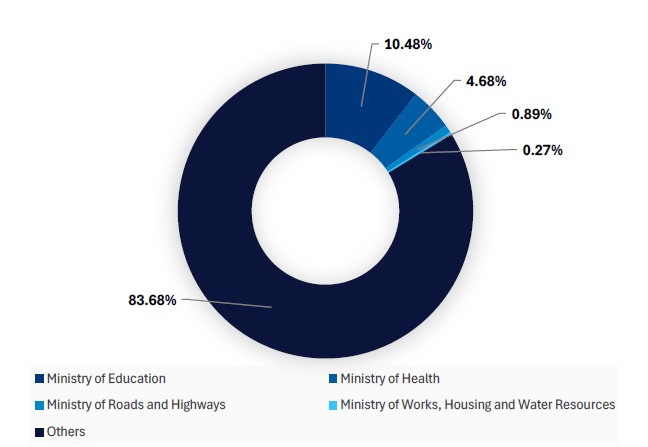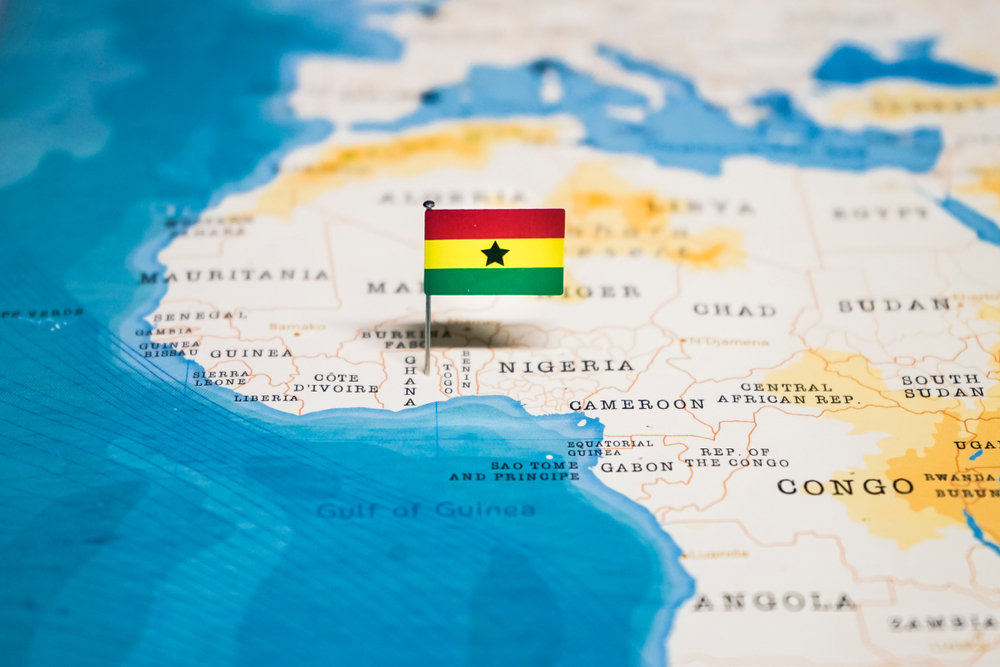On 11 March 2025, Ghana’s minister for finance and economic planning presented Ghana’s 2025 Budget Statement and Economic Policy to the country’s parliament, outlining plans to reduce government expenditure, expand youth-focused programmes, and increase funding for social services. A major aspect of the 2025 budget is tax reforms, including the abolition of certain taxes, most notably the Electronic Transfer Levy, a levy on electronic transfers conducted via both mobile money and banking platforms of 1%, the Emission Levy on industries and vehicles, VAT on motor vehicle insurance policices, and a 1.5% withholding tax on the winning of unprocessed gold by small-scale miners.
The 2025 budget estimates total expenditure at 270.9bn cedis ($16.2bn), reflecting a 3.2% decrease from the 2024 budget allocation of 279.2bn cedis. The reduction in the budget was primarily attributed to the government’s efforts to address a significant fiscal deficit and mounting public debt, coupled with stabilising the economy. The fiscal deficit is projected at 43.8bn cedis – 3.1% of gross domestic product, a significant improvement compared to the previous year’s 56.9bn cedis. According to Ghana’s Ministry of Finance, the total public debt in the country stood at $49.4bn at the end of 2024, which comprised external debt of $28.3bn and domestic debt of $21.1bn. In the 2025 budget, the government has allocated 76.2bn cedis for employee compensation, which includes wages, pensions, gratuities, and social security. Interest payments amounted to 64.2bn cedis, with 56.2bn cedis directed towards domestic debt and 7.9bn cedis for foreign debt. Grants to other government units were estimated at 54.5bn cedis while other expenditures and remittances totalled 36.7bn cedis. Capital expenditures stood at 32.7bn cedis, and spending on goods and services at 6.67bn cedis. This highlights a strong emphasis on debt servicing, public sector obligations, and infrastructure investment.

Access deeper industry intelligence
Experience unmatched clarity with a single platform that combines unique data, AI, and human expertise.
In the 2025 budget, the government made strategic allocations across various ministries to drive economic growth, enhance social welfare, and improve infrastructure development. Some of the major ministries that have received significant expenditure allocation include: the Ministry of Education – 28.4bn cedis; the Ministry of Health – 12.7bn cedis; the Ministry of Roads and Highways – 2.4bn cedis; the Ministry of Works, Housing and Water Resources – 727.1m cedis; the Ministry of Communication, Digital Technology and Innovations – 364.5m cedis; the Ministry of Energy and Green Transition – 354m cedis; the Ministry of Transport – 192.6m cedis; the Ministry of Tourism, Culture and Creative Arts – 166.9m cedis; and the Ministry of Sports and Recreation – 61.8m cedis.


Infrastructure, energy, healthcare, and housing are some of the key areas of focus in the government’s latest budget. The government will prioritise the completion of key road projects in 2025, including the Nsawam-Ofankor, Kasoa-Winneba, Adenta-Dodowa, and Takoradi-Agona Nkwanta dualisation works. Intensive road maintenance will be undertaken nationwide to improve road conditions in 2025. The government will prioritise the completion of some major projects in 2025, which includes the construction of 214km of feeder roads in the Bono East Region (81% completed as of March 2025); rehabilitation of the Tamale-Tatale road and Lot 1 – Tatale-Zabzugu-Yendi Road (90% completed as of March 2025) and Lot 2 – Yendi-Tamale, which is 106km (91% completed as of March 2025); and Sekondi-Takoradi Phase 1 (60% completed as of March 2025). Funds allocated for road infrastructure will focus solely on maintenance and operational improvements to support economic growth. Additionally, the government will continue modernising the Western Railway Line to boost cargo and passenger transport. The government also plans to conduct a fundraising event where private players will be bidding for the various railway projects showcased by the government. Apart from this, the focus of the event will be on electric vehicles (EVs) and other transport policies.
The government will also continue focusing on addressing the national housing deficit of 1.8 million units by completing over 1,000 housing units for flood victims, who were affected in the September 2023 floods and resuming stalled projects like the Saglemi Affordable Housing Project in 2025. Construction will also continue on the 490 units under the Redevelopment Program and additional housing by State Housing Company and TDC Development Company Limited (TDCL). Coastal protection, flood control, and water system projects across several regions will also be prioritised to protect lives and improve living conditions.
As part of the latest budget, the government reported that it will continue expanding Ghana’s renewable energy sector with the construction of 35 mini-grids and 381 solar home systems in off-grid communities. Apart from this, the government also reported that it is currently undertaking multiple solar projects with a combined capacity of 200MW. One such project, which is under construction, includes a 30MW floating solar plant at Bui. To support these efforts, the Renewable Energy and Green Transition Fund will help finance solar systems for public institutions, EV charging stations, and green technology developed locally. As part of the Energy Transition Framework, Ghana is targeting 380,000GWh of electricity demand by 2070, supported by 83GW of generation capacity, including 21GW from renewables.

US Tariffs are shifting - will you react or anticipate?
Don’t let policy changes catch you off guard. Stay proactive with real-time data and expert analysis.
By GlobalDataThe latest budget is anticipated to boost the domestic construction sector, with leading data and analytics company GlobalData projecting Ghana’s construction industry to grow by 5.9% in real terms in 2025. Furthermore, it is expected to maintain an average annual growth rate of 5.2% from 2026 to 2029, supported by investments in the industrial and energy sectors. Over the forecast period, the growth in the construction industry will be supported by the government’s aim to increase the share of renewable energy in the total electricity mix to 10% by 2030 and its plan to generate 30% of electricity from nuclear energy by 2070. The country also aims to decrease its reliance on biomass and increase the share of renewable energy in the generation mix from 42.5MW in 2015 to 1.4GW by 2030 under the 77.9bn cedis Renewable Energy Master Plan. Moreover, President John Mahama committed to implementing a ’24-hour economy’ to boost employment and industrial productivity. The policy promotes round-the-clock operations to drive import substitution and export-led growth.



